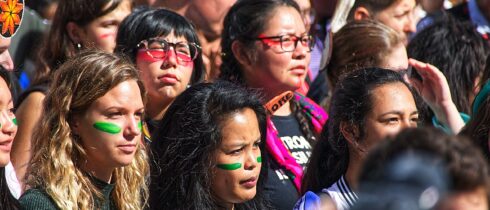

Power to the youth: students across Europe become #ClimateOfChange ambassadors
Power to the youth:
Students across Europe become #ClimateOfChange ambassadors
26 students from 13 different EU countries have been prepared to become youth ambassadors of the #ClimateOfChange campaign and travel to Kenya to raise awareness about the economic, social and environmental impacts of climate change in the global south.
Young people have been of the driving forces of Europe’s green awakening. Yet, their voices are too often underrepresented in the EU policy-making debate.
Encouraged by their spirit of change, the #ClimateOfChange partners organised a series of debate contests in high schools and universities all across Europe. The aim was to give young people a say in the EU’s green discussions, but also to deepen their understanding of the interlinkages between climate change, forced migration and the wider unfair dynamics of the current economic systems.
As a result of these initial debate rounds, each country had the opportunity to send two teams of students to the Pan-EU Debate Contest Final, which took place in Brussels at the beginning of November. There, young participants could collaborate with peers from other countries, discuss with MEPs on EU politics and share their reflections with several NGOs. But the greatest challenge for students those days was proving that they were the best debaters to become official youth ambassadors of the #ClimateOfChange campaign.

Those who obtained the best score during Pan-EU Debate Contest Final has entered a new and exciting phase of the campaign, where they have been trained on the topics and actions of #ClimateOfChange to take wider action in the campaign.
In a series of training sessions with the #ClimateOfChange partners, youth ambassadors have learned about climate change, its consequences on migration, how the current economic system is at the root of both social and climate crisis and how the youth can influence policymakers to tackle this trend through advocacy actions. In addition, these students were formed in communication and campaigning strategies to enhance their action and impact on climate justice.
Their next and most important milestone as youth ambassadors will be a field trip to Kenya, one of the #ClimateOfChange country study cases, to learn about the effects of climate change in the Global South and raise awareness about the EU policy action needed to solve and mitigate such impacts.
Storytelling for change
Campaigners know that powerful stories can move people and transform societies.
To energize youth ambassadors to speak up about the root causes of climate change, they were introduced to different communication tools, campaign guidelines and successful narratives during the training sessions.
Youth ambassadors will be responsible for building awareness in their social media channels about the reasons and consequences behind the climate crisis. Since students will show how Kenyan communities are affected by the impact of an unequal economic system in the field trip, they were trained on how to respectfully, without relying on sensationalist narratives, by giving local people the voice and respecting their image and anonymity rights.
Under the #ClimateOfChange campaign, we believe that participation is core to securing a just transition to a sustainable system that works for all. Accordingly, ambassadors will not only narrate their journey and experiences in Kenya but also encourage their audience to take part in the campaign and take action for a climate of change at local, national and European levels. Promoting our petition on climate justice will be the campaign ambassadors’ call to action in the coming months leading up to COP27.

Advocacy groundworks
After their return from Kenya, the young ambassadors will meet with some members of the European Parliament. The purpose of these online meetings is that the young students are able to directly explain to policymakers what they have experienced in the Global South.
They will use their own stories to open the eyes of the members of the European Parliament about the reality regarding the consequences of the rich countries on the poor ones.

Youth participation is core to securing a just transition to a sustainable system that works for all. Climate change is about environmental degradation, but it also goes beyond that. On a human level, marginalised countries and people are disproportionately hit by its terrible effects, on livelihood, work, health, and access to rights. Countries and individuals who contribute the least to the environmental crisis are the ones who suffer the most from its effects.
#ClimateOfChange partners are very proud of the high satisfaction that the young students shared in the evaluation of the training. The young ambassadors expressed that the knowledge and critical understanding about the different topics of the campaign increased thanks to these training sessions. Their motivation to keep their engagement on climate change problems also increased. In a nutshell, these young people feel empowered to discuss and influence their peers and policymakers, which gives them hope for their future.














